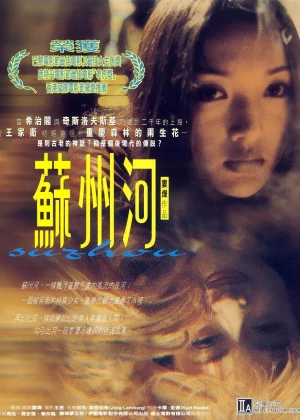Suzhou River
You Le's Suzhou River [Suzhou He] was one of my earliest Chinese favorites. Back then I was still busy discovering the many flavors of Asian cinema, but it was already clear to me that Suzhou River could (and eventually would) become a pivotal film in China's film history. Now I'm about 600 Chinese films further in, the highest time to see how well this one held up. Though it's no surprise that Suzhou River lost some of its original shine, the core quality of the film is still present and I had a good time revisiting Le's breakthrough feature.
![screen capture of Suzhou River [Suzhou He]](/thumbs/img/articles/1200xauto/suzhou-river-1.webp)
Chinese cinema of the 90s is mostly characterized by its rural and/or historic narratives. While famed directors like Yimou Zhang may have found some beauty there, you'll find it's generally a lot of wallowing in despair, poverty and oppression. Zhang himself turned the tables when he directed Keep Cool, Suzhou River is one of the first films to follow in its wake, leaving rural China behind to focus more on its burgeoning urban settings. For me, that was the biggest appeal when I first watched Suzhou River and the main reason why it has stuck with me ever since.
Though the move from rural to urban was quite a shock, Le wasn't quite ready to go for a full upset. Suzhou River isn't a slick, hyper modern romance/mystery, instead it lives on the very edge between the old and the new, making it a perfect example of the transition Chinese cinema was going through at the time. In the following years a younger generation would keep on pushing the concept and kick-start some actual new movements (both in commercial and genre cinema), while others would persevere and keep the oldskool/arthouse Chinese cinema alive.
Moudan is a young girl growing up in Shanghai. There she meets Mardar, a courier who does odd jobs for whoever wants to hire him. Mardar has a girlfriend, but it's clear he's developing feelings for Moudan. Blinded by the promise of riches he joins his girlfriend in a plan to kidnap Moudan and extort money from her dad. Moudan escapes and throws herself in the river, never to be seen again. Years later Mardar bumps into a girl that looks exactly like Moudan, only she doesn't seem to recognize Mardar. He is transfixed by her though and follows her around wherever she goes.
![screen capture of Suzhou River [Suzhou He]](/thumbs/img/articles/1200xauto/suzhou-river-2.webp)
Visually the film is starting to show its age. The camerawork is fine, a bit too jittery maybe, but it succeeds in bringing the audience close to the characters. The lighting is moody and the framing betrays a keen eye for composition. Sadly, the image quality is really subpar. Not sure if the film was shot on DV, but it could definitely do with some cleaning up. The visuals lack clarity and the colors are a bit damp, whereas you'd expect the neon-drenched settings to offer a bit more contrast. The cinematography is really nice, it's just that you have to look through one too many visual defects to catch a glimpse of it.
The soundtrack is interesting, but not quite as defining as I remembered. It's definitely more modern compared to its 6th Generation peers, with less overt Chinese influences and more befitting the film's urban vibe. But it's also a tad generic. The music itself is decent, providing the necessary atmosphere and taking the lead when appropriate, it's just not as powerful and/or enveloping as it could've been. A slightly more leading and distinctive score could've given some extra gloss to the visuals, something that would've pushed the film's expiration date a little further into the future.
The cast is strong across the board. Xun Zhou is one of the prime actresses who fronted a new generation of Chinese films, with stand-out appearances in just about every film she led. She has a natural flair that breathes life into her characters and draws the audience into the screen, a big change from the often so stoical performances seen in older Chinese films. Hongshen Jia and Zhongkai Hua put in fine performances too, but it's no surprise that Zhou would be the only one to make it big. She has a substantial part in the continued success of this film, something Le must've sensed as he offered her a dual role.
![screen capture of Suzhou River [Suzhou He]](/thumbs/img/articles/1200xauto/suzhou-river-3.webp)
Suzhou River takes its time to set up the story, the first half hour in particular can feel a little aimless and disjointed because of that. But once all the pawns are in the right place Le unfolds a gripping romance with some slightly darker edges. There's a bit of added mystery that brings some necessary intrigue in the second half and a beautiful, perfectly balanced finale that holds the middle between tragic and comforting. It makes for a well-rounded film, though in the end it's the atmosphere that gripped me the most.
People with an interest in cinematic history have a lot to chew on here. The move from rural to urban, the modern genre influences, the more intimate style of filming. Suzhou River will forever be seen as being on the forefront of China's big cinematic revolution. The film itself has lost a little of its shine, that said there are enough core qualities left to provide a pleasant experience. The moody and vibrant city shots, the stand-out performance of Xun Zhou and the mysterious romance all add up to a slightly grittier film set in the outskirts of a booming Shanghai. Recommended for people willing to leave rural China behind.
